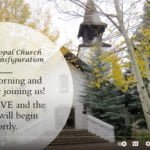We spent much time during Lent and Eastertide earlier this year reflecting together upon claiming time itself as sacred, exploring a variety of spiritual practices further aligning our daily lived experience with Christ. The goal of every practice, every habit, every Rule of Life, every stratagem is to inhabit the Kingdom of the Heavens as God’s reality continues to break into this world. I’d like to re-visit one such habit here in Epiphanytide which has been particularly helpful to me during the trainwreck of 2020. Here I hope to move from the who and the where of Epiphanic manifestation of God to one recommendation of how.
Ignatius of Loyola, the 16th century Spanish Roman Catholic founder of the Society of Jesus (whom you know better as Jesuits), taught the daily review of events he called Consolation and Desolation. His aim was to train his priests to evaluate their day at day’s end so they could better evaluate and recognize God’s grace present in forms expected and familiar, and perhaps surprising and un-familiar. I am indebted to a fine summary found at Loyola Press here.
In brief, Consolation: Directs our focus outside and beyond ourselves, lifts our hearts so that we can see the joys and sorrows of other people, bonds us more closely to our human community, generates new inspiration and ideas, restores balance and refreshes our inner vision, shows us where God is active in our lives and where he is leading us, and releases new energy in us. In brief, Desolation: Turns us in on ourselves, drives us down the spiral ever deeper into our own negative feelings, cuts us off from community, makes us want to give up on things that used to be important to us, takes over our whole consciousness, crowds out our distant vision, covers up all our landmarks, and drains us of energy. In even briefer summary, consoling moments bring us closer to God’s nature and manifest the Kingdom of the Heavens more poignantly, while desolating moments pull us away from God’s nature and further obfuscate the Kingdom of the Heavens from our view.
For me, one surprising outcome of this end-of-day spiritual roundup is the overwhelming amount of consoling moments God sends me daily, especially during this pandemic. I find myself more grateful, more receptive and more attentive to the Holy Spirit than ‘breathless Brooks’ has ever been. I also note the desolations, while seemingly quite dark when they present, somehow become more manageable and more grace-invitations as I turn them over to God before I turn in. This last is a critical step! If I/We don’t do that, then I end up ending my day feeling responsible for the entire world’s darkness. That is not Epiphany!
- Please consider giving this practice a try for more than a few evenings. It only takes a few minutes, and if it demands more attention, I’d suggest providing more attention. At first you may not even be able to recall the entire day, but be patient. Like all muscles, this one works more flexibly over time. Stay with it. Perhaps a short concluding prayer or Prayer Book collect with which to close the day when completed is a good idea. Use a small journal to jot down insights if you prefer.
- Remember this practice is about God’s activity as the Holy Spirit appearing in guises clear and more anonymous, not about our own agency. Feeling good for a moment may well not be true consolation. If you are still reading this devotional you have plenty of scriptural, Prayer Book and theological markers to employ in deciding what’s consoling and what is not.
- Remember also that desolation is not simply what we now call depression or anxiety. Yes, it obviously shares some similar elements but one need not be depressed to be desolated, an important distinction. Everyone experiences desolating events, a lesson Ignatius integrated into his training of clergy. But not everyone knows how to absorb and respond to them faithfully.

